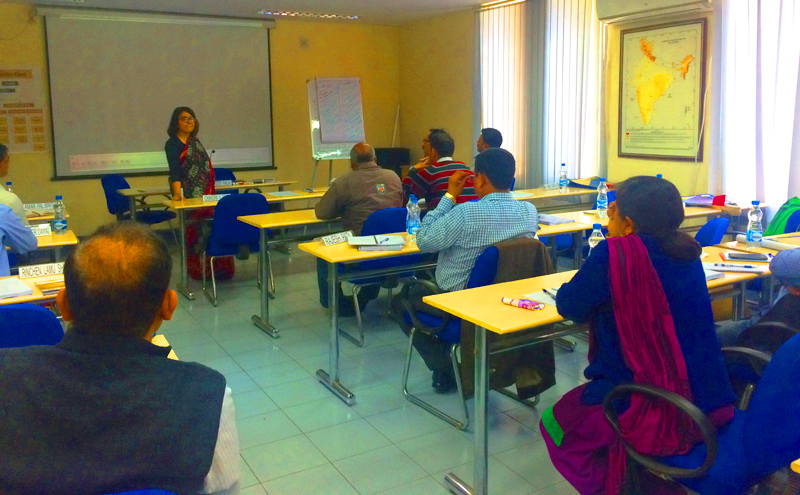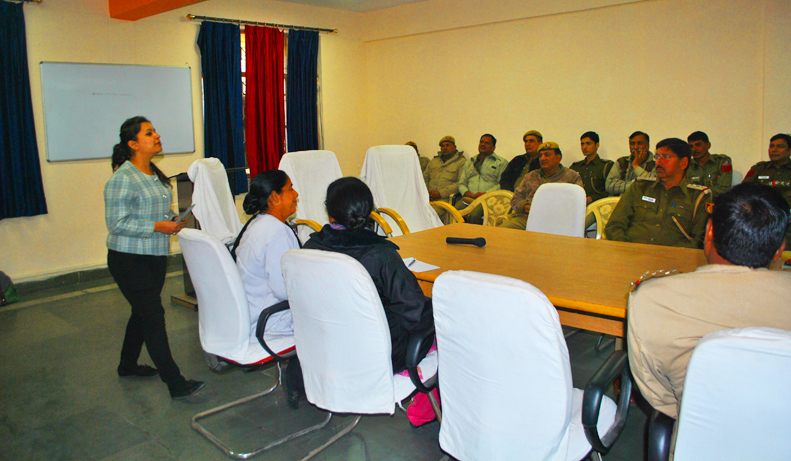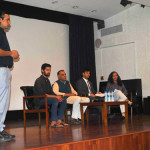Tell us about your journey as a Gender Sensitisation Trainer?
Anubhuti: It started in the month of June 2011, where I had accompanied one of our senior trainers Mr. Amitabh Kumar to Department of Social Work, University of Delhi to conduct basic gender sensitization training under our Campus to Community Project. Coming from a social work academic background, I had a fair idea of gender concepts, but to be a trainer I had to first see what workshops and trainings were all about. After having attended a few trainings, I was entrusted upon taking trainings for the Delhi Police (Do Kadam Police Trainings), which gave me the confidence of being a solo facilitator. But I still felt the need for a senior trainer when it came to slightly tricky topics, like gender budgeting, gender mainstreaming, sexual harassment at workplace, etc. Gradually, I became more confident and could take on these trainings all by myself. The ongoing in house trainings and demonstrations given to us by senior experts working in the field of Gender and our Director, Dr. Kumari helped in building our capacities as trainers. There was a leap from taking basic gender concepts & stereotyping to addressing workshops, trainings specifically on SH@WP, DV, rape, and other gender concepts.


Mehak: My journey began in the year 2013 when I joined this organization as an intern. On the very day of my induction, I assisted Mr. Amaitabh Kumar (Head, Media & Communication and Senior Trainer) and Ms Ishita Y. Aggarwal for conducting Gender Sensitization Training in one of the government organizations, which was my first experience of this kind. It was then at professional level it provoked a lot of thoughts, discussions and events that challenged very much of what I was and how I approached trainings, people and life in general. Hence, reshaping my vision. The journey has been exciting as it involved lot of learning and working together with the senior trainers, colleagues, participants, and sometimes difficult in terms of developing methodology and format which impacts all the participants with their different backgrounds and needs. So in few words, it has been an enriching path which has brought uniqueness of me being a person and a trainer.
Why do you think gender sensitization is important? How does a gender inclusive environment impact a workplace?
Gender, especially in Indian context legitimizes men’s power over women, and this belief needs to be corrected. Gender Sensitization is important as it tells people how wrongly perceived gendered concepts, roles and responsibilities are in bringing about an imbalance among sexes (inequality). It is also very important as gender sensitive issues like gender based violence, sexual harassment at workplace are things people don’t get a right forum to discuss this at, hence the trainings that we do, provide a conducive space for people to discuss and address these issues.
Gender equality has to be achieved in all spheres, be it family, workspace and even in the supreme legislative bodies like our Parliament. The masculine and feminine, both contribute in their own ways in making a workspace healthy. They bring in their positives, which lead to more productivity, which otherwise wouldn’t be, if it’s a pure men or a women dominated space. Also, in a variety of ways it teaches us to be respectful towards the opposite sex. Hence, to be gender healthy wholesome workspace, it is imperative to have a gender inclusive environment.


How much resistance do you face from people when you introduce them to the idea of fluidity in gender roles? How do you overcome this resistance?
Resistance is subjective; it is based on one’s socialization, feelings and opinions. Different people react to the idea of fluidity in gender roles in a different way, reactions varying from mild and light to harsh and serious. There are people who come from absolute rural backgrounds who are more perceptive to gender equality than some who come from the high flown, economically well, educated backgrounds. This clearly proves that these staunch views don’t come based on economic, social, political, educational backgrounds but it’s engrained in the attitudes and mindsets of people.
This resistance is overcome by reasoning, which is carried out not just by talking but by engaging the participants in a activities that are self explanatory in their motive.
What techniques/activities have you found to be most effective when implementing training?
Again it depends on what group are you engaging with. To make your training effective, you should make sure that it doesn’t follow the classroom principle, encourage interactions, engage the participants in interactive & participatory activities and be a good listener.
How do you engage men in a conversation many of them believe to b unimportant/irrelevant/boring?
One of the most integral principles to be followed by a trainer is to respect all the participants attending the training, and be a good listener. Unless these principles are followed, the participants may not come out with their true feelings, beliefs and opinions about the topics that are being discussed in the training.
Citing examples from real life situations, carrying out participatory activities like role plays, showing documentaries, discussions based on case studies, are few of the ways to engage men who find the sessions unimportant, irrelevant and boring.
What are the characteristics of successful training?
Trainings are a two way process, which involves learning and unlearning of ingrained beliefs and attitudes. The training sessions should be participatory and interactive in nature, with its emphasis on the usage of gender training tools like discussions, games, role plays, case studies, narratives, documentaries, etc.
Some of the characteristics of a successful training are the completion of module, a healthy & participatory discussion and feedback.
Looking forward to reading your blogs, you can mail us your entries at WriteWithUs@csrindia.org, or upload them at Write With Us.
Donation for Centre for Social Research to Join our effort in rehabilitating Domestic Violence
Discuss this article on Facebook




